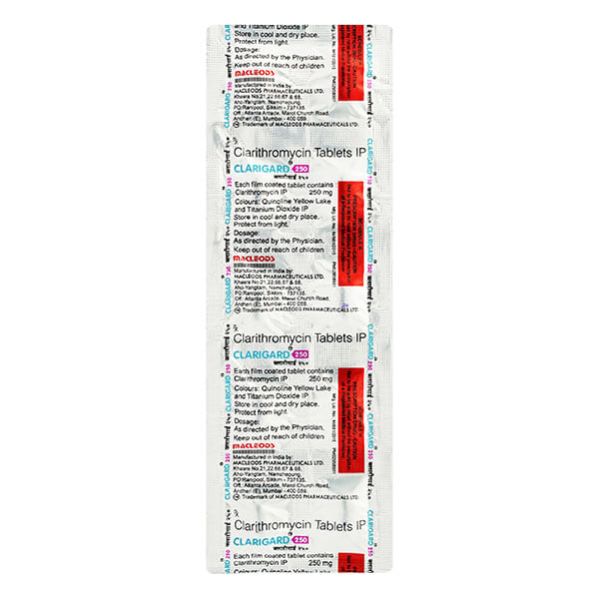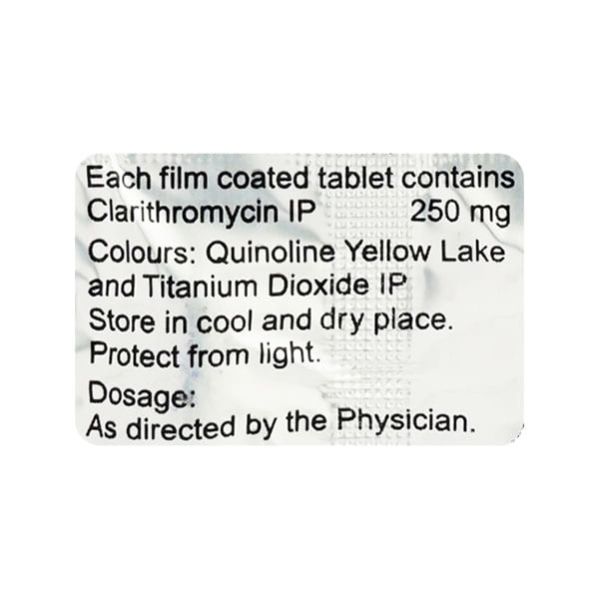Clarigard 250mg Tablet 10'S
CLARITHROMYCIN 250MG
₹ 188.00
₹209
(Inclusive of all taxes)
-

No Warranty
-

COD Avilable
-

Non Returnable
-

cancelable
About this item
INTRODUCTION ABOUT CLARIGARD 250MG TABLET
CLARIGARD 250MG TABLET contains Clarithromycin which belongs to the group of medicines called Macrolide Antibiotics. It is used to manage infections such as upper respiratory tract infections (pharyngitis, and sinusitis), lower tract respiratory infections (bronchitis and pneumonia), middle ear infections (acute otitis media), skin and soft tissue infections (impetigo, folliculitis, cellulitis and abscesses), tooth and mouth infections (periapical abscess, periodontitis) as well as in patients with duodenal ulceration and helicobacter pylori infection.
CLARIGARD 250MG TABLET is also used to manage mycobacterial infections (disseminated or localized) in adults, children and adolescents above 12 years of age. Before prescribing CLARIGARD 250MG TABLET, your doctor may want you to undergo a few diagnostic tests to determine the exact cause of your infection before starting with CLARIGARD 250MG TABLET. Before taking CLARIGARD 250MG TABLET, inform your doctor if you have liver, kidney disorder or have been diagnosed with coronary artery disease, severe heart failure or slowed heart rate.
CLARIGARD 250MG TABLET is not recommended in patients with a history of heart rhythm disorders (such as ventricular cardiac arrhythmia, and fast heart rhythm) and patients with long QT syndrome (abnormality in electrocardiogram). If you are pregnant or breastfeeding, consult your doctor for advice before taking. The most common side effect of taking this medicine is stomach pain, headache, diarrhoea and sleeplessness. Contact your doctor immediately if any of the above symptoms worsen with time.
USES OF CLARIGARD 250MG TABLET
It is used to manage:
- upper respiratory tract infections
- lower tract respiratory infections
- middle ear infections
- skin and soft tissue infections
- tooth and mouth infections
- duodenal ulceration
- helicobacter pylori infections
- mycobacterial infections
HOW CLARIGARD 250MG TABLET WORKS
CLARIGARD 250MG TABLET manages the growth of bacteria by interfering with its protein synthesis and binds specific proteins present in the bacterial ribosomes, thus stopping the growth of the bacteria inside the body, which helps to reduce the infection and its symptoms.
DIRECTIONS FOR USE
Take CLARIGARD 250MG TABLET as advised by your physician. For Tablet: Swallow CLARIGARD 250MG TABLET with a glass of water. Do not crush or chew the medicine. For Dispersible Tablet: Disperse CLARIGARD 250MG TABLET in the specified quantity of water as mentioned in the label. Consume the mixture immediately after reconstitution. Your doctor will decide the correct dose and duration of therapy for you depending upon your age, body weight and disease condition. Continue to take CLARIGARD 250MG TABLET for the stipulated duration prescribed by your doctor to achieve better results.
SIDE EFFECTS OF CLARIGARD 250MG TABLET
COMMON
- insomnia (difficult to fall asleep)
- taste disturbances
- headache
- diarrhoea
- vomiting
- nausea
- indigestion
- stomach pain
- excessive sweating
UNCOMMON
- fungal infection
- vaginal infection
- decrease in white blood cells and neutrophils
- increase in eosinophils
- anorexia
- loss of appetite
- restlessness
- shaking
- dizziness
- sleepiness
- balance disorder
- hearing disorder
- ringing in the ears
- palpitations
- inflammation of the stomach, mouth, and tongue
- bloating, constipation, dry mouth
- burping
- malaise
- asthenia
- chest pain
- chills, fatigue
Stop taking CLARIGARD 250MG TABLET and consult your doctor immediately if you experience any of the following side effects:
- severe or prolonged diarrhoea, with blood or mucus
- skin rash and irritation
- difficulty breathing, fainting
- swelling of the face, tongue, lips, eyes, and throat
- yellowing of the skin (jaundice)
- tender abdomen, loss of appetite
- pale stools, dark urine
- severe skin reactions with painful blistering of the skin, mouth, lips, eyes, and genitals (Stevens-Johnson syndrome/toxic epidermal necrolysis)
- red, scaly rash with bumps under the skin and blisters
- muscle pain or weakness (rhabdomyolysis)
- severe ulceration of the mouth, lips, and skin associated with illness
- inflammation of the internal organs
HOW TO MANAGE SIDE EFFECTS
Diarrhea
Drink lots of fluids, such as water or fruit juices to keep yourself hydrated. Avoid taking any medicine on your own for managing diarrhoea. Consult your doctor if the symptom did not improve.
Headache
Rest and relax. Drink plenty of fluids such as water or electrolytes. Apply a pain-relieving balm on the head if required. Do not consume too much alcohol. Consult your doctor if the symptom did not improve.
Nausea And Vomiting
Take this medicine with, or just after meals. Stick to simple meals. Avoid eating oily-rich or spicy foods.
Stomach Pain
Try to rest and relax. Eat and drink slowly or try to have smaller and frequent meals. Keep a heating pad on your stomach. If the symptom does not improve, contact your doctor.
WARNING & PRECAUTIONS
PREGNANCY
Monitoring requiredCLARIGARD 250MG TABLET is generally not recommended in pregnant women unless the potential benefits justify the potential risk to the fetus. Consult your doctor before taking the medicine.
BREASTFEEDING
ContraindicatedCLARIGARD 250MG TABLET is not recommended in breastfeeding mothers as it may pass into the breast milk. Consult your doctor before taking the medicine.
DRIVING AND USING MACHINES
Use with CautionDo not drive or operate any machines if you feel dizziness, vertigo, confusion, and disorientation after taking CLARIGARD 250MG TABLET.
KIDNEY
ContraindicatedCLARIGARD 250MG TABLET is generally not recommended in patients with severe concurrent kidney failure. Consult a doctor before taking CLARIGARD 250MG TABLET.
LIVER
ContraindicatedCLARIGARD 250MG TABLET is generally not recommended for patients with severe liver failure. Consult a doctor before taking CLARIGARD 250MG TABLET.
ALLERGY
ContraindicatedDo not take CLARIGARD 250MG TABLET if you are allergic (hypersensitive) to Clarithromycin and other macrolide antibiotics or to any other constituents of CLARIGARD 250MG TABLET.
HEART DISEASE
Consult your doctorCLARIGARD 250MG TABLET is not recommended for patients with heart rhythm disorders such as ventricular cardiac arrhythmia, including the type of ventricular tachycardia (torsades de pointes) and if you have long QT syndrome (showing abnormality in electrocardiogram). However CLARIGARD 250MG TABLET should be taken with caution in patients diagnosed with coronary artery disease, severe heart failure or slowed heart rate. Consult a doctor before taking.
USE IN PEDIATRICS
ContraindicatedCLARIGARD 250MG TABLET is generally not recommended for use in children and adolescents under 12 years of age. Consult your doctor before taking CLARIGARD 250MG TABLET.
USE IN GERIATRICS
Use with CautionCLARIGARD 250MG TABLET should be taken with caution in elderly patients as they are prone to develop torsades de pointes arrhythmias (fast ventricular rhythm). Consult a doctor before taking CLARIGARD 250MG TABLET.
OTHERS
CLARIGARD 250MG TABLET is not recommended to be taken if you:
- have abnormal levels of potassium and magnesium in the blood (hypokalemia, hypomagnesemia)
INTERACTIONS
A. Drug-Drug interactions:
Before taking CLARIGARD 250MG TABLET, inform your doctor if you are taking any of the following medicine:
- ergotamine and dihydroergotamine (medicine to manage migraine)
- astemizole or terfenadine (medicine to manage allergy)
- cisapride or domperidone (medicine to manage gastrointestinal disorder)
- pimozide, quetiapine (medicine to manage mental disorder)
- ticagrelor, ranolazine (medicine to manage heart and circulatory disease)
- colchicine (medicine to manage gout)
- lovastatin, and simvastatin (medicine to lower blood cholesterol)
- midazolam, alprazolam, triazolam (medicine to manage anxiety and insomnia)
- rifampicin, rifapentine, rifabutin (used to manage tuberculosis)
- fluconazole, itraconazole (used to manage fungal infection)
- atazanavir, efavirenz, etravirine, nevirapine, ritonavir, saquinavir, zidovudine (medicine to manage HIV)
- digoxin, quinidine, disopyramide, verapamil, amlodipine, diltiazem (medicine to manage heart disturbances and arterial hypertension)
- dabigatran, rivaroxaban, apixaban, warfarin (medicine use to thin blood)
- carbamazepine, valproate, phenytoin, phenobarbital (medicine to manage epilepsy)
- methylprednisolone (medicine to manage inflammation)
- omeprazole (medicine to reduce gastric acid secretion)
- cyclosporine, tacrolimus, sirolimus (medicine used for organ transplant)
- sildenafil, tadalafil, vardenafil (medicine to manage male erectile dysfunction)
- ibrutinib or vinblastine (medicines to manage cancer)
- tolterodine (medicine to manage urinary incontinence)
- sulfonylurea, nateglinide, repaglinide, insulin (medicines to manage diabetes)
- theophylline (medicine to manage asthma)
- St. John’s wort (herbal medicine to manage mild depression)
- gentamicin, amikacin, erythromycin, fidaxomicin (used to manage bacterial infections)
- cilostazol (medicine to manage muscle pain in the lower body)
Overdosage:
If you or anyone else accidentally took more of CLARIGARD 250MG TABLET. consult your doctor immediately. Symptoms of overdose are vomiting and stomach pain.
SYNOPSIS
| Drug | : | Clarithromycin |
| Pharmacological Category | : | Macrolide Antibiotics |
| Therapeutic Indication | : | Manage Bacterial infections |
| Dosage Forms | : | Tablet, Injection, Dry syrup, Oral suspensions, Gel, Granules, Lotion, Solution |
MORE INFORMATION
STORAGE
- Keep out of reach of children
- Store at room temperature
0 Review Of Product Clarigard 250mg Tablet 10'S














